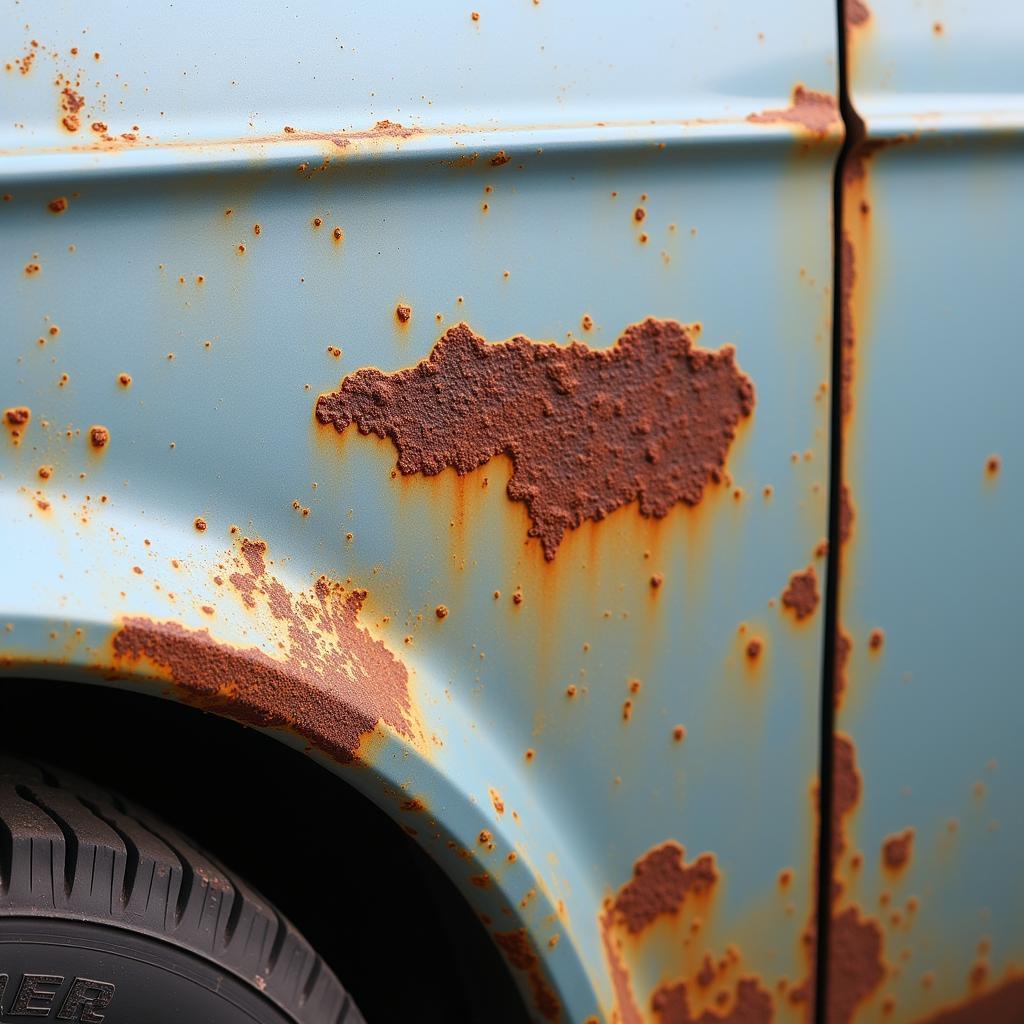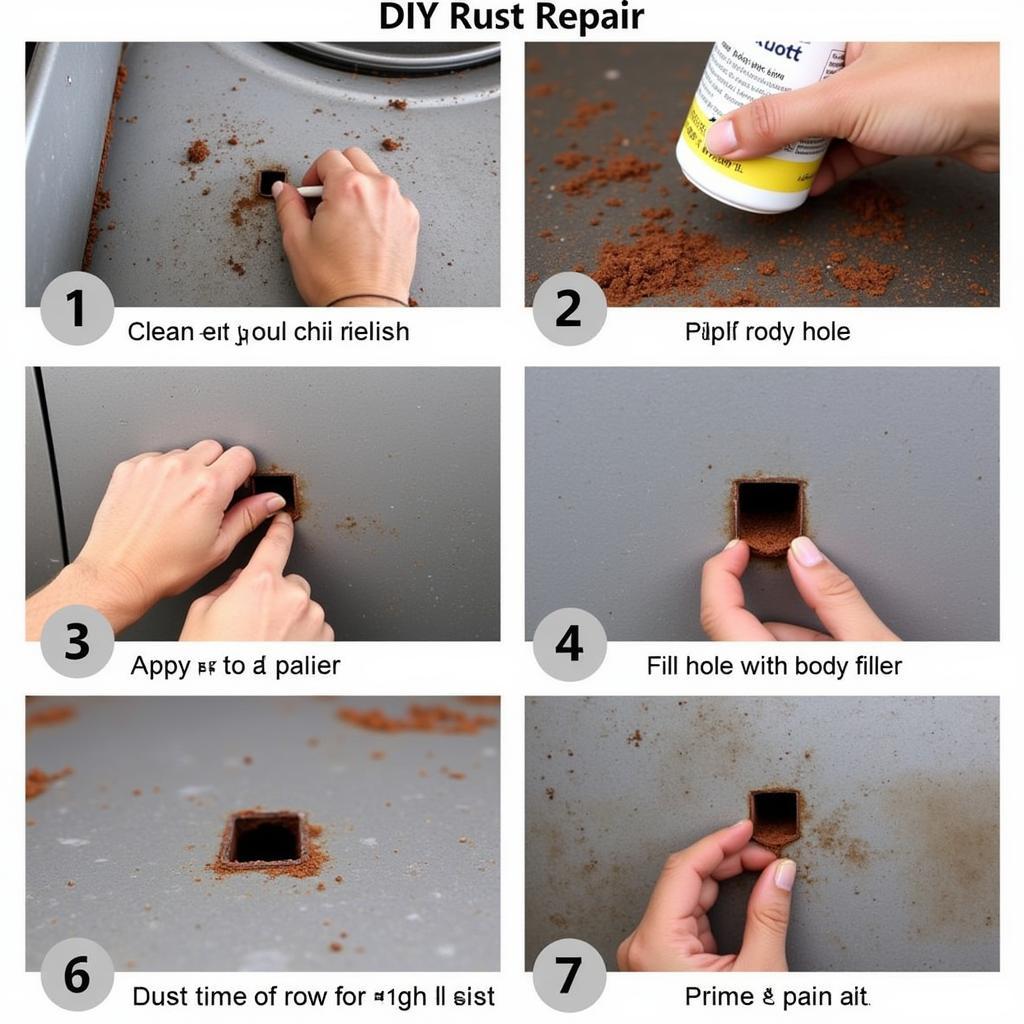Rust holes on your car are more than just an eyesore; they’re a serious structural issue that can compromise the safety and longevity of your vehicle. Knowing How To Fix Rust Holes On A Car is essential for maintaining its value and ensuring a safe driving experience. Addressing rust early can prevent further damage and costly repairs down the line.
Rust forms when iron is exposed to oxygen and moisture, a common occurrence on vehicles due to environmental exposure. Left untreated, small rust spots can quickly grow into larger holes, weakening the metal. This can significantly impact the structural integrity of your car, particularly in critical areas like the frame or undercarriage. Choosing the right repair method depends on the extent of the damage. Can you fix rust holes in cars provides further insights into the repairability of rust damage.
Assessing the Rust Damage
Before you begin any repairs, it’s crucial to assess the extent of the rust. A small surface rust spot can often be treated with a rust converter and some touch-up paint. However, larger holes require more extensive work.
- Surface Rust: This appears as discoloration and a slightly rough texture.
- Scale Rust: The paint starts to bubble and flake, revealing rusty scales underneath.
- Penetrating Rust: This forms holes in the metal and requires patching or welding.
 Assessing Rust Damage on a Car Body Panel
Assessing Rust Damage on a Car Body Panel
DIY Rust Repair: Small Holes
For small rust holes, a DIY approach is often feasible. This involves removing the rust, applying a rust converter, filling the hole with body filler, sanding, priming, and painting. Remember, proper surface preparation is key for a successful repair.
- Clean the area: Use a wire brush or sandpaper to remove all loose rust and paint around the affected area.
- Apply rust converter: This chemically converts the rust into a stable compound.
- Fill the hole: Use body filler and a spreader to fill the hole, ensuring a smooth surface.
- Sand and prime: Sand the filled area smooth and apply primer to prepare for painting.
- Paint and protect: Apply touch-up paint to match your car’s color and finish with a clear coat for protection.
 DIY Rust Repair Process on Car
DIY Rust Repair Process on Car
Professional Rust Repair: Larger Holes
Larger rust holes often require professional intervention. A qualified technician can weld in new metal patches, ensuring a strong and lasting repair. Fixing rust hole in car roof specifically addresses rust repair on the car roof. This method is more complex and requires specialized equipment but offers a more permanent solution.
“Ignoring rust is like ignoring a cavity,” says John Miller, a veteran auto body technician with over 20 years of experience. “It only gets worse over time, and eventually, you’ll have a much bigger and more expensive problem to deal with.”
Preventing Future Rust
Prevention is always the best medicine. Regularly washing your car, especially during winter months, can help remove road salt and other corrosive materials. Waxing your car provides an extra layer of protection against the elements.
- Regular washing and waxing: This helps protect the paint and prevent rust formation.
- Undercoating: Provides a protective barrier against road salt and debris, especially beneficial for undercarriage protection.
- Touch-up paint: Address minor scratches and chips promptly to prevent rust from starting.
Car exhaust fixing offers useful tips for addressing rust on your exhaust system. Addressing rust issues promptly and implementing preventative measures will go a long way in keeping your car rust-free.
How Much Does it Cost to Fix Rust Holes?
The cost of rust repair can vary greatly depending on the severity of the damage and the chosen repair method. DIY repairs for small rust spots can cost as little as $50 for materials. However, professional repairs involving welding can range from a few hundred to several thousand dollars, especially if significant structural damage exists.
“Rust repair is an investment in your vehicle’s longevity,” says Sarah Chen, an automotive engineer with over 15 years of experience. “Addressing it early can save you from more costly repairs down the road and maintain the value of your car.”
Conclusion
Knowing how to fix rust holes on a car is an important aspect of vehicle maintenance. By understanding the different types of rust damage and the appropriate repair methods, you can prevent further deterioration and maintain the structural integrity of your car. Whether you choose a DIY approach or seek professional help, addressing rust promptly is essential for preserving your car’s value and ensuring a safe driving experience. Contact AutoTipPro at +1 (641) 206-8880 or visit our office at 500 N St Mary’s St, San Antonio, TX 78205, United States, for professional assistance and expert advice on fixing rust holes and other car repair issues. Don’t let rust take hold – address it today! How to fix bottom of car can also provide insights into rust prevention and repair for the undercarriage.
FAQ
- Can I drive with rust holes in my car? While small rust holes might not immediately affect drivability, they can weaken the car’s structure and compromise safety, especially in critical areas. It’s crucial to address them promptly.
- Is rust repair covered by insurance? Rust damage due to wear and tear is generally not covered by insurance. However, rust resulting from a collision might be covered depending on your policy.
- How can I prevent rust on my car? Regular washing, waxing, and undercoating can help protect your car from rust. Addressing minor scratches and chips promptly also prevents rust from starting.
- What tools do I need for a DIY rust repair? You’ll need sandpaper, a wire brush, rust converter, body filler, a spreader, primer, paint, and clear coat.
- How long does a rust repair last? The longevity of a rust repair depends on the severity of the initial damage, the quality of the repair, and ongoing maintenance.
- Can I use household items to fix rust on my car? While some household items might temporarily address surface rust, they are not a long-term solution and can even worsen the problem. It’s best to use automotive-specific products.
- What is the best rust converter for cars? Several reputable brands offer effective rust converters. It’s important to follow the manufacturer’s instructions for best results.





Leave a Reply